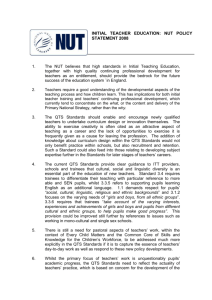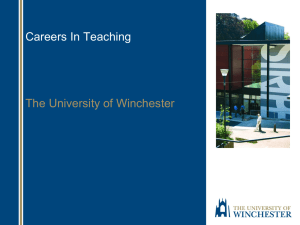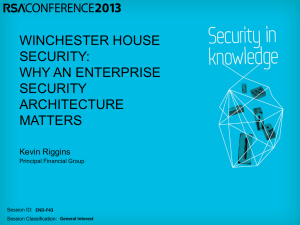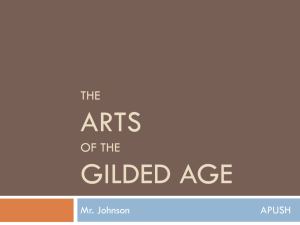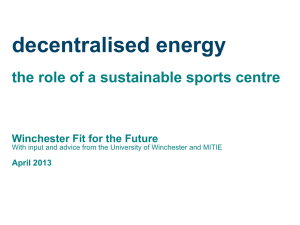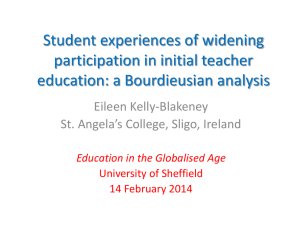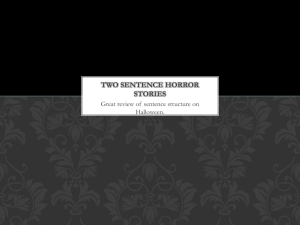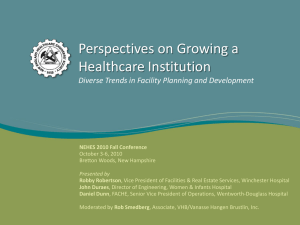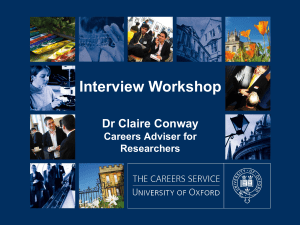Primary Education - University of Winchester
advertisement
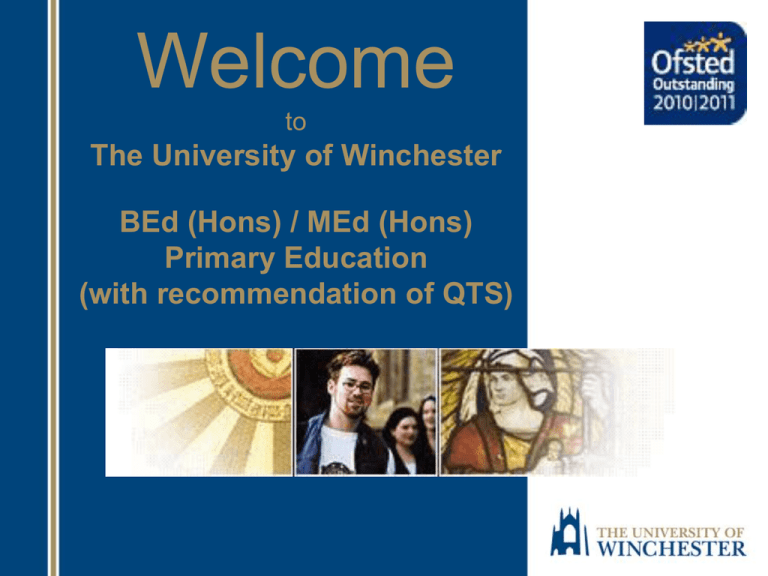
Welcome to The University of Winchester BEd (Hons) / MEd (Hons) Primary Education (with recommendation of QTS) What is special about The University of Winchester? • • • • • • • Good reputation for ITE A smaller university A large ITE provider Caring and committed Well resourced Strong partnership with schools Research informed environment. Initial Teacher Education (ITE) routes to QTS BEd / MEd (Honours) Primary Education is an undergraduate programme leading to Qualified Teacher Status (QTS) (5-11 years) and is located in the Faculty of Education, Health and Social Care. Note also: Education Studies, Childhood Youth and Community Studies Teachers do more than teach; they touch lives Confident professionals A caterpillar does not become a butterfly by sticking on wings. It has to go through a process of transformation. Alexander, T. and Potter, J. (2005) Education for a Change, London: Routledge Our Vision of the Winchester ITE Student • Reflective practitioners who acknowledge the complexity of their role • Confident and creative thinkers who are at the forefront of innovative practice • Open-minded, curious and willing to engage with different perspectives • Motivated, enthusiastic and responsive to the needs of children • Knowledgeable professionals equipped with skills to make informed decisions • Lifelong learners who work flexibly within professional communities Integrated Masters All students are encouraged to register for the 4 year route, then decide in Semester 2, Year 2 Common Year 1 and Year 2 BEd (Hons) 3 year route – QTS BEd (Hons) 4 year route – QTS and opportunity to enhance and enrich professional practice and to obtain up to 120 Master’s credits for award of MEd (Hons) with QTS. Supported and informed decision Early career development Rights Respecting Education • Unicef UK, Amnesty UK, • Hampshire Rights Respecting Schools: ‘Roles, Rights, Responsibilities’ (RRR) • values, citizenship, sustainability, social justice Programme themes Identity Perspectives Relationships • • • • individuals, groups, communities theory and practice complexity and critique impacts on learning and teaching Module strands • Professional Theory, Practice and Research • Curriculum Studies • Subject Specialism Professional Theory and Research • Professional Theory • • • • Teachers & Schools Learners and Learning The Inclusive Classroom Perspectives on Education • Individual research project Curriculum Studies • • • • Primary English, mathematics, science ICT for primary learning Wider curriculum - full primary range Options for enrichment in Year 3 and 4 Subject specialism ~introductory sessions for all in Year 1 ~dedicated modules from Years 2 - 4 Currently – indicative list • • • • • • • • Art and Design Drama Early Years English French (MFL) Geography History Mathematics • • • • • • Multimedia & ICT Music Physical Education Religious Education Science Special Educational Needs (SEN) School Experience • Placements • Year 1 - 3 weeks + 3 weeks - paired • Year 2 - 6 weeks • Year 3 - 10 weeks • Year 4 –10 weeks • Self Directed Placements / Volunteering • 4 weeks total (Year 1 & 2) • Specialist Subjects • Curriculum Days & Events School Experience • Wide geographical partnership of schools • Optional placements in London, Isle of Wight and the Channel Islands • SEN settings, on request • Accommodation arranged for students on placements a long way from normal residence. A strong, established, effective, University / School Partnership Self Directed Placements / Volunteering - UK • • • • • • • Schools Libraries Museums, interactive centres Holiday clubs Sports coaching Fieldwork … Self Directed Placements / Volunteering – international Including … Soma School Gambia, South Africa, Ghana, Uganda, Thailand, India, Japan, New York … Erasmus/Comenius European exchange (agreements include Austria, Estonia, Belgium, Finland, Spain, Denmark, Norway) Student Research Conference, Latvia 9-11 11-1 Mon Lead lectures Core English Tue Lead lectures 2-4 ICT Ed Theory School Prep Wed UNIVERSITY SPORTS Thur Wider Curriculum Wider Curriculum Fri Lead Lectures Groupwork 4-6 Wider Curriculum Teaching approaches • • • • • • Lectures, generally interactive Seminars, tutor and student-led Workshops Conferences & guest presentations E-Learning School based tasks to integrate theory & practice. Assessment • • • • • • Written assignments Presentations/seminars Portfolios Online Audits Practical Workshops School Experience Support • • • • • • • Student buddies and representatives Professional Development Tutor (PDT) Year group tutor Subjects tutors and programme leadership Link tutor and teacher tutor in school Faculty Academic Advisor University Student Services Do you measure up? Are you prepared to ‘get your hands dirty?’ Are you ready for new challenges? Can you work in a team? Are you a problem solver? Can you lead the way? Can you take charge? Are you a good communicator? Are you a careful listener? Can you take different roles? Do you enjoy ‘getting out and about’? Are you ready to try something new? Can you recognise exciting opportunities for learning? Are you imaginative? Do you have a sense of fun? Student Perspectives … ‘Grade 1 Outstanding’ (Nov 2010) Key strengths: • the high quality of training, assessment and tracking systems, which leads to the outstanding progress and achievement of trainees • the coherence of central and school-based training • the highly effective and individualised support for trainees, particularly those with disabilities ‘Grade 1 Outstanding’ (Nov 2010) • training in equalities and diversity, which results in trainees’ impressive levels of confidence and understanding • the tutorial system, which provides exemplary support for individual trainees • the opportunities that specialist placements and self-directed days provide for trainees to pursue either their own specialist professional interests ‘Grade 1 Outstanding’ (Nov 2010) • the content and structure of the professional studies modules, which ensures that trainees have a clear understanding of professional issues • the flexibility of the training programmes, which encourages suitable applicants from a wide range of circumstances to apply. Application All ITE courses are oversubscribed so careful completion of the UCAS form is very important. The content and presentation of the personal statement is an important element in being invited for interview – make sure you shine! BEd/MEd (Hons) Entry requirements • GCSE grade C or above in English, mathematics and science • 300 - 340 points at A level (or equivalent) e.g. BBB - AAB from 3 A levels, however as many students take more than 3 A levels, the grades needed may be lower. • BTEC National Diploma/Certificate – DDM • CACHE Diploma • International Baccalaureate currently 26 points, including 5 at higher level • Access course pass with 30 credits at Distinction and 15 at Merit if under 21 • Other points count as part of the total, e.g. AS Levels, Extended Project Please see the University of Winchester Prospectus For Codes & Entry Requirements, Tariffs & Other Qualifications BEd/MEd (Hons) Entry requirements ‘Recent and relevant experience’ • Experience in school, classroom based, in KS1 and/or 2 is essential (at least 2 weeks) • After school clubs and early years experience are valuable but not sufficient of themselves • Experience preferably still active at time of application. Personal Statement • Enthusiasm for primary teaching! • Academic strengths – links to learning and teaching • Experience with learners in school contexts, in less formal / voluntary settings and how that has informed your views on learning and teaching • Personal strengths & accomplishments - hobbies and interests that show how you might contribute to the University and school communities • Organisation and style – paragraphs, sentence construction, coherence in written statement, spelling, grammar and punctuation. Skills Tests What? A Government requirement - online skills tests in literacy and numeracy Why? To demonstrate specific knowledge and skills prior to training to be a teacher - a national standard Who? Centrally managed tests - need only be passed once as they will serve for any and all ITE QTS courses When? You are required to pass the skills tests before your place is confirmed with any ITE programme. Skills Tests and Application The University of Winchester requires applicants invited to interview to bring evidence to their interview that they have passed or booked to take the Literacy and Numeracy skills tests. These tests should normally be passed within three months of submitting an application to UCAS and definitely by the time you confirm a University place. Offers will remain conditional until the tests have been passed. Further information can be found at www.education.gov.uk/schools/careers/traininganddevel opment/professional A strong statement … leads to interview … with a University tutor and a Headteacher from a Partnership school … … to probe evidence on the application form and reference and explore suitability for course / teaching • Individual interview • Group task and discussion • Short written task If you are successful at interview… Any offer will also be subject to successful • QTS Skills Tests • Disclosure and Barring Service (DBS) formerly CRB - clearance • Medical ‘Fitness to Teach’ assessed by an Occupational Health Advisor • Completion of further 10 days in school(s) prior to start of course, where directed tasks are completed. Initial Teacher Education quotas are nationally allocated Teaching is a wonderful career…. Thank you visiting – enjoy your day in Winchester! Still have questions? course.enquiries@winchester.ac.uk Programme Leader BEd/MEd (Hons) Primary Education Helen.Clarke@winchester.ac.uk Director of Teacher Development Kriss.Turner@winchester.ac.uk

